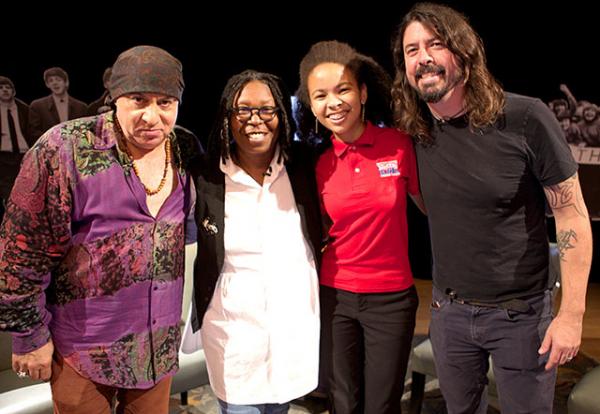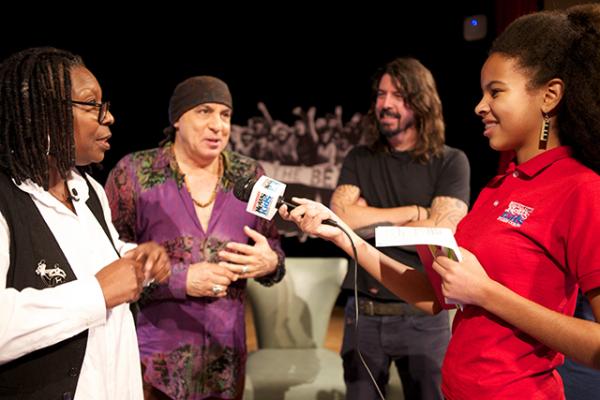KID REPORTERS’ NOTEBOOK
The Beatles: Influencing the Past, Present, and Future

When the Beatles first arrived in the United States in 1964, the British rock band brought hope and inspiration to millions of young Americans. At a recent event at Scholastic Headquarters in New York City, Whoopi Goldberg, co-host of ABC’s The View, Dave Grohl of the Foo Fighters and Nirvana, and Steve Van Zandt, a member of Bruce Springsteen’s E Street Band, talked about the British group’s far-reaching influence.
The stars told more than 200 local students how the Beatles had shaped their own lives and careers, and how the band’s music continues to inspire new generations of young people.
 Adedayo with Stevie Van Zandt, Whoopi Goldberg, and Dave Grohl
Adedayo with Stevie Van Zandt, Whoopi Goldberg, and Dave Grohl
At the event, students also saw clips of The Beatles: Eight Days a Week, The Touring Years, a new documentary by Ron Howard. The film captures much of the excitement that John Lennon, Paul McCartney, George Harrison, and Ringo Starr—the “Fab Four,” as they were called—generated when they played to sold-out crowds worldwide in the mid-1960s.
“Girls were blowing their heads off,” said Goldberg, who grew up in New York City. She remembered the joy that she felt when her mother surprised her with tickets to a Beatles concert at Shea Stadium in 1965.
COURAGEOUS ARTISTS
The Beatles captured the hearts of countless fans with their upbeat love songs. As their popularity grew, so did their musical range.
“They started out with these really nice sing-along pop hits, but in a pretty short period of time, they had blossomed,” said Grohl. The Beatles, he added, went on to write “lyrics that meant something really important. They were brave, creatively.”
Amid the turbulence of the 1960s, “the Beatles were our sanity,” said Van Zandt. “It was a tough time. There was a lot of crazy stuff going on. Our president [John F. Kennedy] had been assassinated. We had the Vietnam War, civil rights, and women’s rights.”
To counter the tumult, Lennon “wrote ‘Give Peace A Chance,’ and it [became] the anthem for a whole generation,” Grohl added.

Music “is truly the universal common language,” Van Zandt told Adedayo.
The Beatles also helped unify the country at a time of racial unrest. “The fact that they said we’re not going to play a segregated place was huge,” said Goldberg, recalling that the Beatles refused to play in a Jacksonville, Florida, stadium that did not allow black people equal access. “You can’t understand what that did for kids like me…. Suddenly, [black people] could go to a concert [and] not have to sit under the stage, or not have to sit outside and listen to it. They could sit right next to the other person who was there and participate.”
More than 50 years later, the Beatles’ music lives on. “They set the standards,” said Van Zandt, who launched the Rock and Roll Forever Foundation in 2007. The nonprofit organization, which has teamed up with Scholastic, provides online materials about the history of music to students and teachers.
“There is nothing better than music” to help educate kids, Van Zandt said. “It is truly the universal common language.”
Photos by Gina Asprocolas
